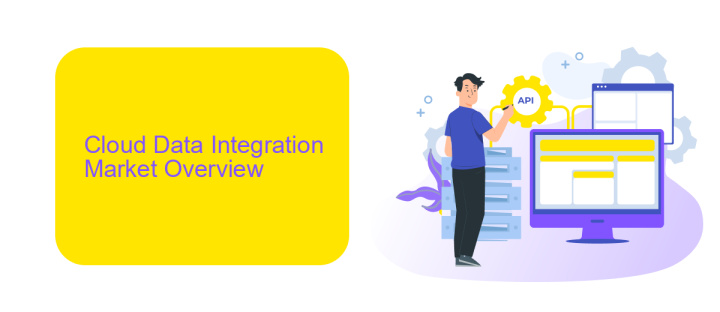Cloud Data Integration Tools
Cloud data integration tools have revolutionized the way businesses handle and analyze their data. By seamlessly connecting disparate data sources and applications, these tools enable organizations to streamline their operations, enhance data accuracy, and gain valuable insights in real-time. In this article, we explore the key features, benefits, and top providers of cloud data integration tools that are transforming the digital landscape.
Introduction
In today's data-driven world, the ability to seamlessly integrate various data sources is crucial for businesses to maintain efficiency and competitiveness. Cloud data integration tools have emerged as essential solutions for organizations looking to unify their data from disparate systems into a cohesive and actionable format. These tools simplify the process of connecting different applications, databases, and services, ensuring that data flows smoothly and is readily accessible for analysis and decision-making.
- Automated data synchronization
- Real-time data access
- Scalability and flexibility
- Enhanced data security
- Cost-effectiveness
One notable example of such a tool is ApiX-Drive, which offers a user-friendly platform for setting up integrations without the need for extensive coding knowledge. By leveraging cloud data integration tools like ApiX-Drive, businesses can streamline their operations, reduce manual data handling, and ultimately make more informed decisions based on unified and up-to-date information. The adoption of these tools is not just a trend but a necessity in the modern digital landscape.
Cloud Data Integration Market Overview

The cloud data integration market is experiencing rapid growth as businesses increasingly rely on cloud-based solutions to manage and integrate their data. With the proliferation of data sources and the need for real-time data access, companies are seeking robust tools that can seamlessly connect disparate systems. This demand is driven by the need for enhanced operational efficiency, improved decision-making, and the ability to leverage big data analytics. Major players in the market are continuously innovating to offer comprehensive solutions that cater to diverse business needs, ensuring data is integrated smoothly and securely.
One notable service in this market is ApiX-Drive, which simplifies the integration process by providing a user-friendly platform for connecting various applications and services. ApiX-Drive allows businesses to automate workflows, reduce manual data entry, and ensure data consistency across platforms. By offering pre-built connectors and a straightforward setup process, ApiX-Drive enables organizations to quickly and efficiently integrate their cloud data, thus enhancing productivity and enabling a more agile business environment. As the market continues to evolve, tools like ApiX-Drive will play a crucial role in facilitating seamless data integration.
Features and Benefits of Cloud Data Integration Tools

Cloud Data Integration Tools offer a streamlined approach to managing and synchronizing data across various platforms, ensuring seamless data flow and consistency. These tools are essential for businesses looking to enhance their data management and analytics capabilities.
- Scalability: Easily scale your data integration processes to meet growing business demands.
- Real-time Data Sync: Ensure that your data is always up-to-date across all systems.
- User-friendly Interface: Tools like ApiX-Drive provide intuitive interfaces that simplify the integration setup process.
- Cost Efficiency: Reduce operational costs by automating data workflows.
- Enhanced Security: Protect sensitive data with robust security measures and compliance standards.
By leveraging these features, businesses can achieve higher efficiency and accuracy in their data operations. Tools like ApiX-Drive enable users to automate data transfers between various applications without requiring extensive technical knowledge, making data integration accessible to everyone.
Challenges and Considerations

Integrating data from multiple cloud sources presents several challenges that organizations must navigate. One primary concern is ensuring data consistency and accuracy across different platforms. As data moves between systems, there is a risk of discrepancies that can lead to flawed analytics and decision-making.
Another significant consideration is data security and compliance. Organizations must ensure that data integration processes adhere to regulatory requirements and that sensitive information is protected throughout the transfer. This is especially crucial when dealing with personal or financial data.
- Data consistency and accuracy
- Security and compliance
- Scalability and performance
- Cost management
To address these challenges, tools like ApiX-Drive can be instrumental. ApiX-Drive offers automated workflows that help maintain data integrity and streamline integration processes. By using such services, organizations can reduce manual intervention, minimize errors, and ensure that their data integration efforts are both efficient and compliant with industry standards.


Vendor Landscape and Future Trends
The vendor landscape for cloud data integration tools is diverse, with established players like Informatica, Talend, and MuleSoft dominating the market. These vendors offer comprehensive solutions that support various data integration needs, from ETL processes to real-time data synchronization. Additionally, emerging platforms such as ApiX-Drive are gaining traction due to their user-friendly interfaces and robust integration capabilities. ApiX-Drive, for instance, simplifies the process of connecting different applications and automating workflows, making it an attractive option for businesses of all sizes.
Looking ahead, the future trends in cloud data integration tools are likely to be shaped by advancements in artificial intelligence and machine learning. These technologies will enable more intelligent data mapping and transformation, reducing the manual effort required for integration tasks. Furthermore, the demand for hybrid and multi-cloud environments will drive the development of more flexible and scalable integration solutions. As businesses continue to prioritize data-driven decision-making, the importance of efficient and seamless data integration will only grow, pushing vendors to innovate and enhance their offerings continuously.
FAQ
What is Cloud Data Integration?
Why is Cloud Data Integration important?
What are the common challenges in Cloud Data Integration?
How can I automate data integration processes?
What should I look for in a Cloud Data Integration tool?
Strive to take your business to the next level, achieve your goals faster and more efficiently? Apix-Drive is your reliable assistant for these tasks. An online service and application connector will help you automate key business processes and get rid of the routine. You and your employees will free up time for important core tasks. Try Apix-Drive features for free to see the effectiveness of the online connector for yourself.

